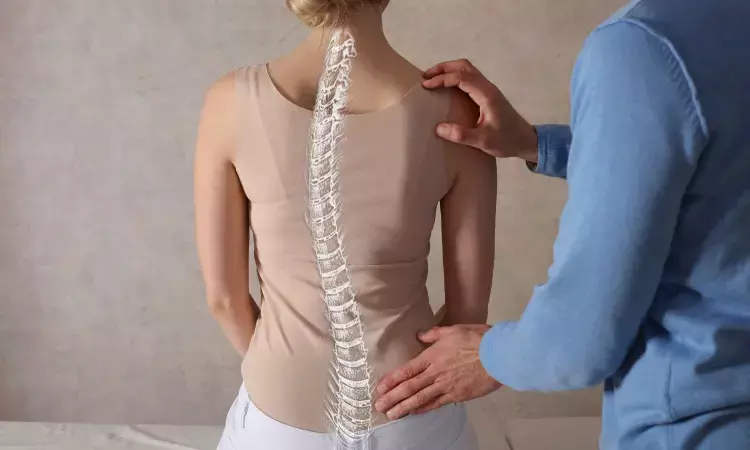- Home
- Medical news & Guidelines
- Anesthesiology
- Cardiology and CTVS
- Critical Care
- Dentistry
- Dermatology
- Diabetes and Endocrinology
- ENT
- Gastroenterology
- Medicine
- Nephrology
- Neurology
- Obstretics-Gynaecology
- Oncology
- Ophthalmology
- Orthopaedics
- Pediatrics-Neonatology
- Psychiatry
- Pulmonology
- Radiology
- Surgery
- Urology
- Laboratory Medicine
- Diet
- Nursing
- Paramedical
- Physiotherapy
- Health news
- Fact Check
- Bone Health Fact Check
- Brain Health Fact Check
- Cancer Related Fact Check
- Child Care Fact Check
- Dental and oral health fact check
- Diabetes and metabolic health fact check
- Diet and Nutrition Fact Check
- Eye and ENT Care Fact Check
- Fitness fact check
- Gut health fact check
- Heart health fact check
- Kidney health fact check
- Medical education fact check
- Men's health fact check
- Respiratory fact check
- Skin and hair care fact check
- Vaccine and Immunization fact check
- Women's health fact check
- AYUSH
- State News
- Andaman and Nicobar Islands
- Andhra Pradesh
- Arunachal Pradesh
- Assam
- Bihar
- Chandigarh
- Chattisgarh
- Dadra and Nagar Haveli
- Daman and Diu
- Delhi
- Goa
- Gujarat
- Haryana
- Himachal Pradesh
- Jammu & Kashmir
- Jharkhand
- Karnataka
- Kerala
- Ladakh
- Lakshadweep
- Madhya Pradesh
- Maharashtra
- Manipur
- Meghalaya
- Mizoram
- Nagaland
- Odisha
- Puducherry
- Punjab
- Rajasthan
- Sikkim
- Tamil Nadu
- Telangana
- Tripura
- Uttar Pradesh
- Uttrakhand
- West Bengal
- Medical Education
- Industry
Scoliosis linked to increased lifetime risk of major adverse cardiac events

In their latest study, researchers from National Heart and Lung Institute, Imperial College London, have explained the interplay between scoliosis and cardiac manifestations. They have identified an increased lifetime risk of major adverse cardiovascular events in adults of the UK Biobank who had history of scoliosis.
Abnormal spinal curvature increases mechanical constraint on the heart, causing diastolic dysfunction. The higher the severity of the deformity, the greater the aggravation of ventricular and right atrial pressure.
This original research on Cardiac risk factors and prevention was published in BMJ Open Heart, entitled "Identification of an increased lifetime risk of major adverse cardiovascular events in UK Biobank participants with scoliosis."
It is already known that Structural changes due to spinal curvature impact organs within the thoracic cage, including the heart. Cardiac abnormalities in scoliosis (idiopathic ) patients are often studied post-corrective surgery or secondary to diseases. Such patients have a high incidence of congenital heart disease.
The above background needs more research and data.
In this study, the team investigated the cardiac structure, function and outcomes in scoliosis patients, phenotype and imaging data of the UK Biobank (UKB).
Hospital episode statistics (502 324 adults with scoliosis), summary 2D cardiac phenotypes [ 39 559 cardiac MRI (CMR) scans], and 3D surface-to-surface (S2S) were analysed.
The study results are:
- 4095 (0.8%) UKB participants aged 40-69 years, mostly of European ancestry, had all-cause scoliosis with an increased lifetime risk of major adverse cardiovascular events (MACEs) with HR=1.45.
- This was driven by heart failure and atrial fibrillation, with HR of 1.58 and 1.54, respectively.
- Scoliosis participants had Increased radial and decreased longitudinal peak diastolic strain rates.
- S2S analysis revealed Cardiac compression of the heart's top and bottom and the sides' decompression.
- Researchers reported an association between scoliosis and older age, female predilection, heart failure, valve disease, hypercholesterolemia, hypertension and decreased enrolment for CMR.
They explained, "Our study found that spinal curvature due to scoliosis alters the heart's movement. For consideration of surgical correction, association with increased MACE is the most crucial clinical implication. "
The study is the first to provide data on altered cardiac function and an increased lifetime risk of MACE in scoliosis patients.
The study's major limitations include Selection bias, discrimination of scoliosis aetiology and lack of data on measures of scoliosis severity.
Further investigations are warranted to research the background more.
Further reading:
BDS, MDS in Periodontics and Implantology
Dr. Aditi Yadav is a BDS, MDS in Periodontics and Implantology. She has a clinical experience of 5 years as a laser dental surgeon. She also has a Diploma in clinical research and pharmacovigilance and is a Certified data scientist. She is currently working as a content developer in e-health services. Dr. Yadav has a keen interest in Medical Journalism and is actively involved in Medical Research writing.
Dr Kamal Kant Kohli-MBBS, DTCD- a chest specialist with more than 30 years of practice and a flair for writing clinical articles, Dr Kamal Kant Kohli joined Medical Dialogues as a Chief Editor of Medical News. Besides writing articles, as an editor, he proofreads and verifies all the medical content published on Medical Dialogues including those coming from journals, studies,medical conferences,guidelines etc. Email: drkohli@medicaldialogues.in. Contact no. 011-43720751


